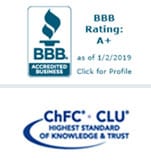
In 2024, the Bureau of Labor Statistics predicts that 65-69-year-olds will make up 36% of the workforce. Since most Americans with health insurance receive coverage through their employer, workers approaching 65 must choose between remaining on their employer’s plan or enrolling in Medicare. This is a highly individual decision, with many variables at play. When deciding to enroll in Medicare or stay on your employer’s plan, here are the four factors you’ll need to consider.
1. The Size of Your Employer
If your employer has less than 20 employees, you must sign up for Medicare Parts A and B. If you fail to enroll in Medicare during the seven-month enrollment period around your 65th birthday, you will face a late enrollment penalty and may experience a gap in coverage. After you enroll in Medicare, your employer’s plan acts as secondary coverage.
Individuals who work for large employers can choose to delay Medicare enrollment without penalty. However, if you leave your job, you will need to enroll in Medicare Parts A and B within 8 months or face permanently increased Part B premiums.
2. Your Spouse and Children
Staying on your employer’s plan can be beneficial if your spouse is too young to enroll in Medicare and depends on you for health insurance. Similarly, if you have children under the age of 26 who do not receive outside health coverage, you may want to keep your current insurance. In some cases, it can be beneficial to enroll in Medicare Part A (hospital insurance), in addition to an employer’s plan. Medicare Part A is premium-free, with a hospital inpatient deductible of $1,364 in 2019. This way, your family members will continue to be covered, while you receive some of your Medicare benefits.
3. Cost of Premiums, Deductibles, and Co-Pays
Depending on your current insurance plan, Medicare may offer more extensive coverage for a better price. However, determining how to get the best health insurance for your buck is rarely an easy process. We recommend sitting down with a Medicare expert to compare the differences in premiums, deductibles, and coverage to make sure you are getting the best deal possible. This is also the time to consider the benefits and tradeoffs of enrolling in a Medicare supplement or Medigap plan, in addition to original Medicare.
4. Access to an HSA
Some employers provide workers with health savings accounts (HSAs), that allow tax-free contributions, growth, and withdrawals, provided the funds are used for legitimate healthcare expenses, such as paying your health insurance premium or deductible. Depending on how much you contribute, HSA’s can help lower your tax bill. However, once you enroll in Medicare Part A, you will no longer be able to contribute to an HSA. If you lack important coverage under your employer-sponsored plan, this may not be an issue. Again, this is a situation where you will need to crunch the numbers with a professional you can trust.


Sara McKinney
saractag@gmail.com
As Cowen Tax Advisory Group’s Digital Content Marketing Specialist, Sara provides in-house copywriting and manages the company’s electronic records system, email marketing, and blog.





